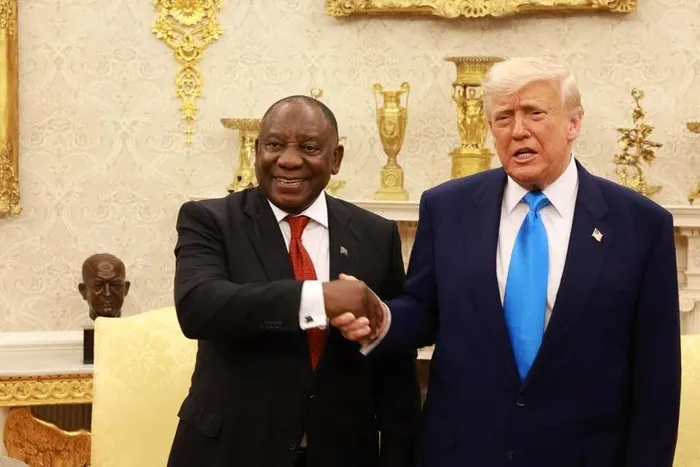Trump's tariff threat: Huge implications for the BRICS bloc and global trade

South Africa will be hit with a 30% tariff on all its exports to the United States from August 1, following a formal letter from US President Donald Trump to President Cyril Ramaphosa demanding action on trade imbalances and long-standing market restrictions.
Image: GCIS
The threat of higher tariffs on BRICS nations by US President Donald Trump has sparked a heated debate about the future of global trade and economic stability.
According to Trump, BRICS, conceived two decades ago as a forum for fast-growing economies, and its growth and expansion posed a threat to US dominance in the global economy.
At a recent summit in Rio de Janeiro, the 11-nation bloc, which included South Africa Brazil, Russia, India, and China, criticised Trump's imposed tariffs.
In response, Trump accused the group of "anti-Americanism" and pledged an additional 10 percent tariff on their goods.
South African President Cyril Ramaphosa has condemned Trump's threat, saying efforts to "punish" the bloc were disappointing. "BRICS does not seek to compete with any other power," Ramaphosa said on Monday.
"The bloc advocates for the emergence of various centres of power in the world," he said.
Ramaphosa emphasised that the BRICS bloc's goal was to promote cooperation and advance humanity's interests, not to compete with any particular country.
"There should never be vengeance. There should never be retribution against countries that are seeking to cooperate and to advance the interests of humanity," he said.
The potential impact of Trump's tariffs on South Africa's economy was a major concern to many organisations representing workers.
Cosatu spokesperson Matthew Parks said the federation supported Ramaphosa’s articulation in defence of the need for BRICS and how such multilateral engagements help strengthen world peace and boost trade and investment opportunities.
“Cosatu is deeply concerned about the 30% tariff announced by US President Donald Trump, because it will have a devastating impact on the economy that has been languishing at 1% growth rate and a shockingly high unemployment rate of 43.1%.
He said sectors that would be hard hit included the automotive, agriculture, clothing, chemical and jewellery industries
"Worryingly, the impact of the impending tariff is already being felt in the Eastern Cape with 900 jobs on the line at Good Year SA and Mercedes Benz 'temporarily' shutting down its vehicle production,” he said.
Parks said it was clear that more engagement with the US government was required to find alternatives that would be beneficial for jobs and businesses in both countries.
However, the South African Communist Party (SACP) spokesperson Mbulelo Ndlazana said that the party was not surprised by Trump's stance and South Africa should consider more options other than the US.
“The SACP has consistently advocated for an economic delinking South Africa from economies of the north, particularly the United States.
“The anticipated spinoffs of BRICS economic relationships and agreements have not yet materialised, providing insufficient cushioning for the South African economy from economic decisions and actions by the United States and the West. This reality exposes us to heightened economic peril,” Ndlazana said.
Trade union Solidarity said South Africa can avoid the US's 30% trade tariff if Ramaphosa acts swiftly.
It said that despite the tariff taking effect on August 1, negotiation room remains as it critised the government's inaction, noting that the US seeking both a political and economic settlement.
Dr. Dirk Hermann, Solidarity CEO, said the SA government missed chances for a favorable trade deal, blaming "ideological narrow-mindedness and political arrogance" for potential job losses.
He stressed the government's failure to understand the US's demands and South Africa's trade dependence.
The Union highlighted South Africa's failure to escape tariffs unlike other nations.
Hermann urged Ramaphosa to engage the Trump administration to avoid the tariff, warning it could effectively terminate the AGOA trade agreement, which Solidarity worked hard to preserve.
International relations expert Dr. Noluthando Phungula believes that Trump's motivation for threatening the BRICS bloc was rooted in his desire to maintain US dominance in the global economy.
"As the Head of State and a representative of the unipolar superpower bloc, Trump is reasonably threatened," Phungula said.
"The BRICS expansion and growth speak to a clearer call from the Global South towards multilateralism. This inadvertently challenges Western dominance and calls for a reformation of international power structures,” Phungula said.
She said South Africa should stand firm in the face of US pressure, particularly when considering the leveraging strategies used by Trump.
Another international relations expert Saul Molobi, who was also a former Consul-General to Italy, said BRICS does not directly compete with the US economy, but it does challenge America's global dominance.
"It's a push for a multipolar system – from alternative development banks to talk of de-dollarisation – it chips away at Washington's leverage," Molobi said.
"For Trump, that's a threat to his 'America First' worldview,” he said.
mashudu.sadike@inl.co.za
Related Topics: